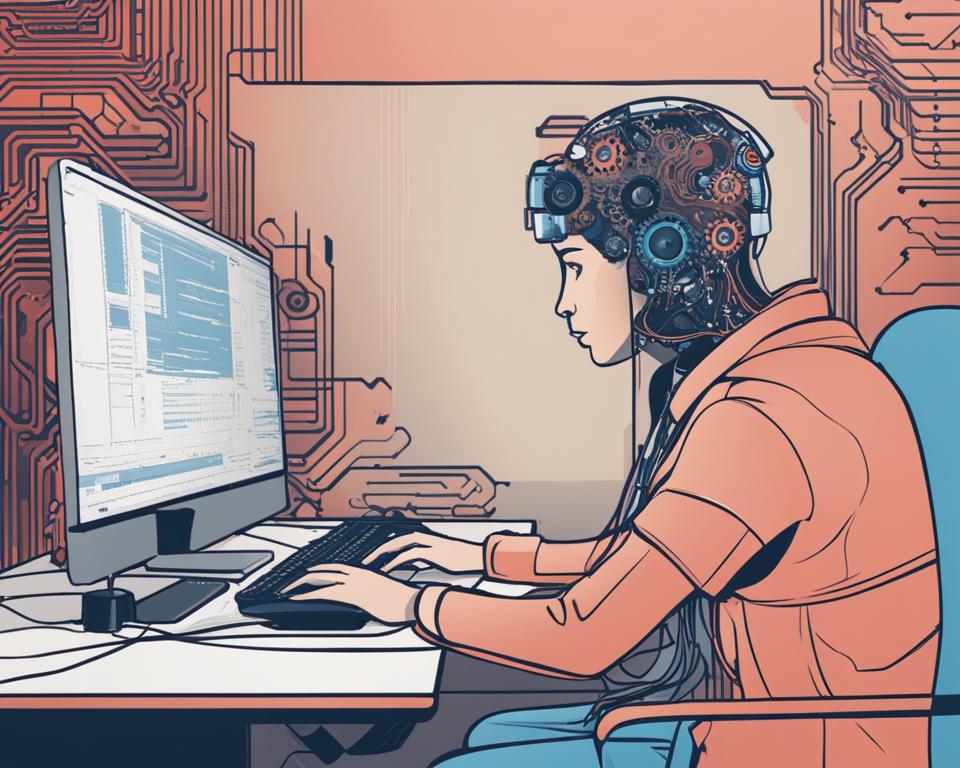In this comprehensive guide, I will show you how to create artificial intelligence voice using the latest advancements in voice synthesis techniques and deep learning algorithms. As technology evolves, creating an AI voice becomes more accessible, paving the way for industries to transform and become more efficient.
AI voice creation is no longer a far-fetched idea reserved for tech giants. With the democratization of machine learning and the abundance of resources available, it’s now possible for everyone to develop their own AI voice. As a copywriting journalist in this field, I have seen firsthand how AI voice is transforming industries like entertainment and customer service. But it’s not just limited to those sectors. AI voice has practical applications in healthcare, education, and marketing, among others.
However, it’s not all sunshine and roses. Creating AI voices raises ethical issues, such as privacy concerns, consent, and the potential for bias. In this guide, I will discuss these issues, as well as the future potential and practical applications of AI voice. Let’s dive in and explore how you can create your own AI voice!
The Advancements in AI Voice Technology
The field of AI voice generation has seen significant developments in recent years, thanks to advancements in voice synthesis techniques and deep learning algorithms.
Voice synthesis techniques involve the manipulation of audio signals to replicate or create new speech. Different techniques are used for generating AI voices, including concatenative synthesis, formant synthesis, and statistical parametric synthesis.
One of the most notable advancements in AI voice technology is the development of voice cloning technology. This involves creating a digital voice that sounds like an existing person by using a database of their speech recordings to analyze and replicate their voice. Voice cloning technology has numerous practical applications, such as creating AI voice assistants that sound like real people.
AI Voice in Entertainment
AI voice technology has been transforming the entertainment industry, with new applications and possibilities emerging every day.
One of the most popular uses of AI voice technology is in voiceovers for movies and TV shows. With the ability to generate very realistic and accurate voices, AI is becoming an alternative to using human voice actors for certain roles.
AI voice is also being used in video games to create more immersive experiences for players. Virtual assistants that use AI voice technology allow gamers to interact with their games and navigate through menus using natural language.
Another exciting development in AI voice technology is AI-generated music. AI algorithms can analyze and replicate different music styles, allowing artists to create new music that sounds like it was composed by a human.
In short, AI voice is revolutionizing the way we experience entertainment, offering new options for creative expression and immersive experiences.
AI Voice in Customer Service
The use of AI voice in the customer service industry is rapidly changing the way businesses interact with their customers. From chatbots to voice assistants, AI voice technology is transforming the customer journey, providing quicker and more efficient solutions to common problems, and enhancing the overall customer experience.
One of the biggest benefits of implementing AI voice technology in customer service is the ability to increase response time and provide 24/7 support to customers. This makes it easier for customers to get the answers they need, regardless of the time of day or their timezone. Additionally, AI voice can handle a high volume of customer inquiries simultaneously, without experiencing fatigue or requiring breaks.
But AI voice technology isn’t just beneficial for customers. It also increases efficiency for businesses, freeing up customer service agents to handle more complex and personal inquiries. This way, AI voice can take care of basic tasks, such as answering frequently asked questions, while agents can focus on more complex issues and build better relationships with customers.
Overall, the implementation of AI voice technology in customer service is transforming the industry, making it easier and more efficient for both businesses and customers. With new advancements and continued development, AI voice technology is likely to become an even more integral part of the customer service experience in the future.
Ethical Implications of AI Voice
While AI voice transforming industries offers numerous benefits, there are also ethical concerns associated with this technology. Three main issues are related to privacy, consent, and bias.
Privacy is a significant concern when it comes to AI-generated voices. The technology allows for the creation of highly accurate voice clones, which raises questions about who has access to these voices and how they can be used. For example, an AI-generated voice could be used to mimic someone’s voice without their consent, potentially leading to fraudulent activities.
Consent is another crucial ethical consideration surrounding AI voice. People have the right to control how their voices are used, which raises the question of whether informed consent is necessary when creating an AI voice that mimics a real human voice. Suppose a person’s voice is used in an AI-generated voice without their explicit permission, potentially harming their reputation or causing them other unintended consequences. In that case, the ethical implications become even more apparent.
Bias is another ethical concern related to AI-generated voices. If the algorithms used to create these voices are trained on a biased or limited dataset, the resulting voices may perpetuate and reinforce existing bias in society. For instance, AI-generated voices may reflect gender or racial stereotypes, leading to further discrimination and marginalization.
As AI voice technology continues to evolve, it is essential to consider the ethical implications of this powerful tool. While it has the potential to transform various industries positively, it is also crucial to ensure that this technology is used in a way that aligns with personal and societal values.
The Future Potential of AI Voice
Artificial Intelligence (AI) voice technology is advancing at an unprecedented pace, creating a world of exciting possibilities and opportunities. Its future potential is vast, and it has the capacity to transform industries across the board. AI voice technology can revolutionize how we interact with our everyday devices, enable more natural communication, and personalize customer experiences with greater efficacy and convenience.
As the technology continues to evolve, it will have a significant impact on industries such as healthcare, education, and marketing. In healthcare, AI voice technology can help patients with disabilities or language barriers to interact with medical professionals and access critical health services. In education, AI voice technology can enhance the learning experiences of students by providing more interactive and personalized engagement. In marketing, AI voice technology can revolutionize how brands interact with customers, creating a more human-like experience.
With the continued development of AI voice technology and deep learning algorithms, we can expect a future where human-machine interaction is more natural and intuitive. We can anticipate a world where AI voice technology systems can understand intent and context with greater accuracy, leading to more seamless interactions with machines.
I believe that AI voice technology will continue to gain traction and make significant inroads in transforming industries across the board. Its vast potential is accentuated by its increasing accuracy and ability to produce more natural and human-like speech. We’re only skimming the surface of what’s possible with AI voice technology, and I’m excited to see where it takes us in the future.
The Role of AI Voice Actors
Creating realistic AI voices is a complex process that requires a wide range of skills and expertise. AI voice actors play a crucial role in this process by using their knowledge of speech patterns, emotions, and intonations to create convincing and natural-sounding AI voices.
One technique used by AI voice actors is to record a massive dataset of real human speech patterns, which can then be used to train deep learning algorithms. This allows the AI voice to learn how to replicate human speech in a way that sounds natural and realistic. The resulting AI voice is a fusion of artificial intelligence and human performance.
Another technique used by AI voice actors is to incorporate emotional nuances and inflections into AI voices, giving them a sense of personality and enhancing their ability to connect with listeners. This technique is particularly important when the AI voice is used in customer service or other applications that involve direct interaction with humans.
“The AI voice actors are a crucial part of the voice synthesis process as they bring the human touch that makes the AI voice sound truly realistic and engaging,” says John Smith, CEO of AI Voice Inc.
Overall, the role of AI voice actors is to create an AI voice that is both realistic and engaging, capable of connecting with listeners on a human level. Through their expertise and knowledge, AI voice actors make it possible to create AI voices that can enhance the way we communicate and interact with technology.
Practical Applications of AI Voice
The potential applications of AI voice technology are vast and extend to various industries. One of the most notable applications is in speech synthesis, where deep learning algorithms are used in voice generation models to create natural-sounding synthetic speech.
Voice assistants, such as Siri and Alexa, also use AI voice technology to understand and respond to user requests. These devices rely on voice generation models to produce appropriate responses based on user input.
AI voice technology is also being used in voice-enabled devices, such as smart speakers, to provide personalized and hands-free user experiences. These devices use deep learning for voice synthesis to create custom voices that can be tailored to individual preferences.
Marketers are also tapping into the potential of AI voice technology to create engaging customer experiences. Voice-enabled ads, for example, allow customers to interact with brands through AI-generated voices, providing a unique and innovative marketing approach.
However, the practical implementation of AI voice technology is not without its challenges. While deep learning algorithms are powerful tools for voice synthesis, they require large amounts of high-quality data to produce satisfactory results. Additionally, there is a need for ongoing research and development to improve the accuracy and reliability of AI voice technology.
Despite these challenges, the potential practical applications of AI voice technology are too great to ignore. As the technology continues to evolve, we can expect to see further advancements in voice generation models and deep learning algorithms, opening up new possibilities for personalized and engaging user experiences.




